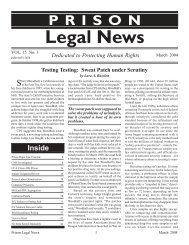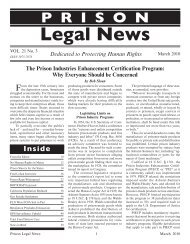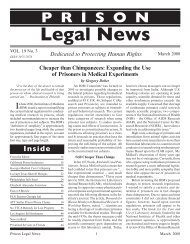From the Editor - Prison Legal News
From the Editor - Prison Legal News
From the Editor - Prison Legal News
You also want an ePaper? Increase the reach of your titles
YUMPU automatically turns print PDFs into web optimized ePapers that Google loves.
April 2008<br />
Drug-Resistant Staph Infection (MRSA) Deaths Nationwide<br />
Now Exceed Those <strong>From</strong> AIDS; <strong>Prison</strong> Connection Ignored<br />
The Journal of <strong>the</strong> American<br />
Medical Association (JAMA)<br />
reported that nationwide, more deaths in<br />
<strong>the</strong> United States are now resulting from<br />
drug resistant invasive MRSA (methicillin<br />
resistant staphylococcus aureus) skin<br />
infections than from AIDS. Overall, an<br />
estimated 90,000 invasive MRSA infections<br />
occur annually nationally — a rate<br />
of 32 per 100,000 people. The October<br />
2007 JAMA report called this rate “astounding.”<br />
While many staph cases are<br />
simply mild skin infections, <strong>the</strong> invasive<br />
ones studied here are life-threatening,<br />
entering <strong>the</strong> bloodstream or destroying<br />
flesh.<br />
PLN has reported extensively on<br />
MRSA infections in prisons and jails<br />
(see: PLN, Aug. 2007, p.1). Indeed, <strong>the</strong><br />
greatest liability (58.4%) turns out to be<br />
for patients in community care settings, a<br />
category that includes nursing homes and<br />
correctional settings. Infections acquired<br />
in a hospital, often incidental to elective<br />
surgeries, account for 26.6 %. Ano<strong>the</strong>r<br />
13.7% arise in “community-associated”<br />
functions (this category includes schools<br />
and sports teams), while <strong>the</strong> remaining<br />
1.3% were unclassified. There was also a<br />
strong correlation with age (3 times more<br />
prevalent in those over 65) and race (2<br />
times more prevalent in blacks), while<br />
gender was not a factor.<br />
The JAMA study surveyed data from<br />
nine urban regions around <strong>the</strong> country,<br />
and analyzed 5,287 reported invasive<br />
cases. 90% were in <strong>the</strong> form of bloodstream<br />
infections, while <strong>the</strong> remaining<br />
10% were flesh-eating disease. Among <strong>the</strong><br />
5,287 infections, <strong>the</strong>re were 988 deaths.<br />
Thus, even with hospitalization and <strong>the</strong><br />
latest antibiotics, one’s chances of dying<br />
from invasive MRSA approaches a staggering<br />
20%.<br />
As a result, hospitals have taken<br />
drastic preventive steps. Obvious was<br />
<strong>the</strong> need for yet improved hygiene<br />
procedures by hospital staff, including<br />
improved hand-washing. Many hospitals<br />
have also recognized that many<br />
patients serendipitously harbor <strong>the</strong><br />
MRSA organisms already when <strong>the</strong>y<br />
arrive, and to <strong>the</strong> extent possible, <strong>the</strong>y<br />
isolate <strong>the</strong>m until <strong>the</strong>y are first screened<br />
of MRSA. It is also known that about<br />
by John R. Dannenberg<br />
5% of all U.S. hospital and nursing<br />
home patients suffer from mild MRSA<br />
skin infections, which, if <strong>the</strong>y were to<br />
invade an open wound or enter <strong>the</strong><br />
body through invasive medical equipment<br />
(e.g., dialysis shunts, ca<strong>the</strong>ters, or<br />
intravenous tubing), could develop into<br />
systemic infections.<br />
The JAMA report concluded that<br />
invasive MRSA infections disproportionately<br />
affect patients in health care<br />
settings, but are no longer confined to<br />
hospital intensive-care units. Since prisons<br />
and jails present many of <strong>the</strong> same<br />
cross-infection attributes of health care<br />
centers and nursing homes (e.g., common<br />
socialization areas, dining rooms, and air<br />
handling systems), <strong>the</strong>y plainly remain<br />
major sources of potential outbreaks. Dr.<br />
Federal Healthcare Receiver Investigates<br />
Out-of-State Deaths of Transferred California<br />
<strong>Prison</strong>ers, but Does His Authority Follow Them?<br />
The federal court-appointed Receiver<br />
for California’s prison healthcare<br />
system is investigating <strong>the</strong> deaths of four<br />
prisoners who were transferred to outof-state<br />
facilities, but stopped short of<br />
declaring <strong>the</strong> deaths suspicious or negligent.<br />
His concern is heightened because <strong>the</strong><br />
California Department of Corrections and<br />
Rehabilitation (CDCR) is presently engaged<br />
in selectively shipping 8,500 foreign national<br />
prisoners to privately-run facilities around<br />
<strong>the</strong> country in order to meet federal court<br />
demands to reduce <strong>the</strong> state’s overcrowded<br />
prison system.<br />
Court-appointed Receiver Robert<br />
Sillen, who has since been replaced, spoke<br />
at <strong>the</strong> Sacramento Press Club in July 2007<br />
and called three of <strong>the</strong> four out-of-state<br />
prisoner deaths “not quite natural.” He<br />
said his staff was reviewing <strong>the</strong> prisoners’<br />
medical files to determine if <strong>the</strong>ir<br />
deaths were preventable. The prisoners<br />
died in Nevada, Arizona, Tennessee and<br />
an undisclosed location under <strong>the</strong> federal<br />
witness protection program.<br />
However, it is not clear whe<strong>the</strong>r<br />
prisoners transferred out-of-state due to<br />
38<br />
by John E. Dannenberg<br />
Buddy Creech, a Vanderbilt University<br />
infectious disease specialist, called <strong>the</strong><br />
spread of drug-resistant MRSA “epidemic”<br />
and hopes <strong>the</strong> new JAMA report<br />
will spur development of a “holy grail”<br />
MRSA vaccine.<br />
Sadly, this report barely even mentions<br />
<strong>the</strong> MRSA epidemic sweeping<br />
prisons and jails around <strong>the</strong> country and<br />
<strong>the</strong> spread of <strong>the</strong> disease from <strong>the</strong>se facilities<br />
into <strong>the</strong> community, as PLN has<br />
extensively reported in <strong>the</strong> past. Once<br />
again, <strong>the</strong> public health impact of mass<br />
imprisonment is largely ignored by <strong>the</strong><br />
medical establishment.<br />
Sources: Journal of <strong>the</strong> American Medical<br />
Association, vol. 298, Vol. 15, pp. 1763-<br />
1771 (October 2007).<br />
overcrowding, who are typically housed<br />
at private facilities, are covered under <strong>the</strong><br />
protections of <strong>the</strong> Plata v. Schwarzenegger<br />
prison healthcare receivership. If<br />
<strong>the</strong>y are, that might create a conflicting<br />
two-tier program for healthcare delivery:<br />
<strong>the</strong> profit-driven substandard care<br />
typical of private prisons and <strong>the</strong> federal<br />
constitution-dictated standard of care<br />
provided under <strong>the</strong> Receiver. Recentlyenacted<br />
California Penal Code § 11191(4)<br />
expressly provides that prisoners with<br />
serious physical or mental illnesses may<br />
be excluded from involuntary transfers<br />
if <strong>the</strong>ir condition or scheduled medical<br />
treatment qualifies.<br />
But one thing remains certain. The<br />
size of <strong>the</strong> CDCR’s out-of-state population<br />
will continue to grow as California<br />
attempts to palm off its prison overcrowding<br />
problem on <strong>the</strong> backs of<br />
foreign-national prisoners. Over 400 of<br />
<strong>the</strong> planned 8,500 foreign nationals had<br />
already been shipped to o<strong>the</strong>r states as of<br />
September 2007.<br />
Sources: Associated Press, www.scpr.org<br />
<strong>Prison</strong> <strong>Legal</strong> <strong>News</strong>

















